Civil war is for idiots and losers
Your neighbor is not your enemy.
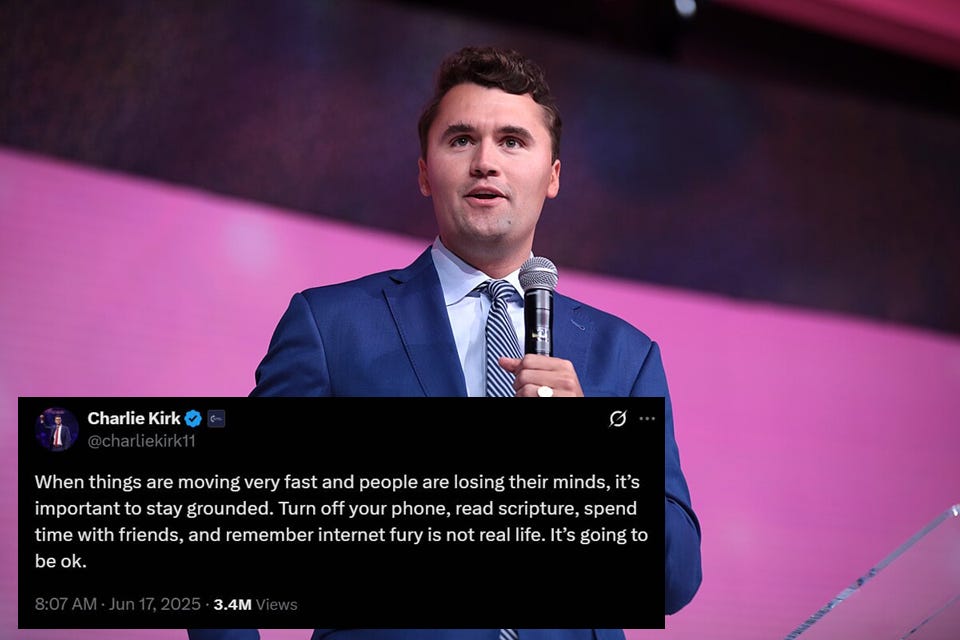
Charlie Kirk, a conservative commentator and founder of Turning Point USA, was brutally assassinated while participating in a live debate in Utah. As of this writing, the assassin has not been caught. FBI Director Kash Patel tweeted that the suspect had been apprehended, but a little while later tweeted that suspect had been released, and that the investigation was ongoing:
Because it’s not clear who shot Kirk, it’s not known what the motive was. It could be a confused, politically inscrutable lunatic, like the two assassins that took aim at Donald Trump last year. It could be someone on the political left, who hated Kirk’s conservative politics; there were certainly plenty of those. Or it could be someone on the political right, who thought Kirk wasn’t sufficiently rightist. For example, Kirk had received a lot of hate from the white supremacists known as “groypers”:
And Kirk certainly had rivals for influence within the MAGA movement, such as Laura Loomer.
So unless and until the killer is caught, we won’t have any idea about the motive behind Kirk’s murder. That fact should be obvious. And yet it’s not stopping many figures on the political right from assuming that the killer was a lefty, and calling for extreme measures in response:
This seems very foolish to me. First of all, it’s risky to jump to conclusions. If the killer is caught and turns out to have been a rightist, or a politically confused nutcase, what are all of these people screaming for war against “the left” going to say? “Ahh well, nevertheless”?
Second of all, hatred begets hatred, and violence begets violence. When people like Elon Musk and Matt Walsh blame their political enemies for something like this, it simply encourages rightists to go out and do more of the same. Maybe that makes sense if you think you’re in the middle of a civil war, and the way to fight that war is to sit safely behind your keyboard and make inflammatory remarks until someone somewhere with less to lose goes out and murders someone from the other team. But if you’re a sane, normal, reasonable person who wants to go to work and love their family and have a functional, stable country, then you shouldn’t go around screeching for civil war.
Even worse, some right-wing influencers are using Kirk’s assassination to call for the implementation of fascism and a violent purge of the Democratic Party:
Recall that the Reichstag fire was a leftist arson attack (or possibly a Nazi false flag attack) that Adolf Hitler used as a justification to implement full fascism in Germany.
This is obviously some insane and evil stuff. But at the same time, whether or not the killer himself turns out to have been a lefty or a righty, there’s a grain of truth to the accusations that the online left encourages violence. I thought Donald Trump was actually on pretty solid ground when he called out radical leftists for poisonous rhetoric:
For years, those on the radical left have compared wonderful Americans like Charlie [Kirk] to Nazis and the world’s worst mass murderers and criminals. This kind of rhetoric is directly responsible for the terrorism that we’re seeing in our country today.
Whether or not the assassin who killed Charlie Kirk was on the left, there were certainly plenty of anonymous leftists cheering his death:
And let’s not forget the outpouring of online leftist glee after Luigi Mangione murdered health insurance executive Brian Thompson.
The people writing things like this are not famous or powerful or individually significant in any way. But the incredible amount of engagement and approval that tweets like this receive shows that this kind of hateful, violent sentiment does exist, in nontrivial amounts.
In fact, I should note that I myself have been a target of extreme leftist rhetoric on a fairly regular basis. Here’s just one small example:
On anonymous platforms like X and Bluesky, the marginal cost of calling anyone and everyone a Nazi is zero, so everyone calls everyone a Nazi. And malignant trolls get attention and status by whipping up fear and extremism. Of course, rightists do this too. The result is a constant toxic mix of alarmism and extremism, no matter where you sit on the political spectrum.
Before social media, toxic sentiments like this certainly existed, but they rarely surfaced. Social media is simply unique in how extreme and divisive its content is:
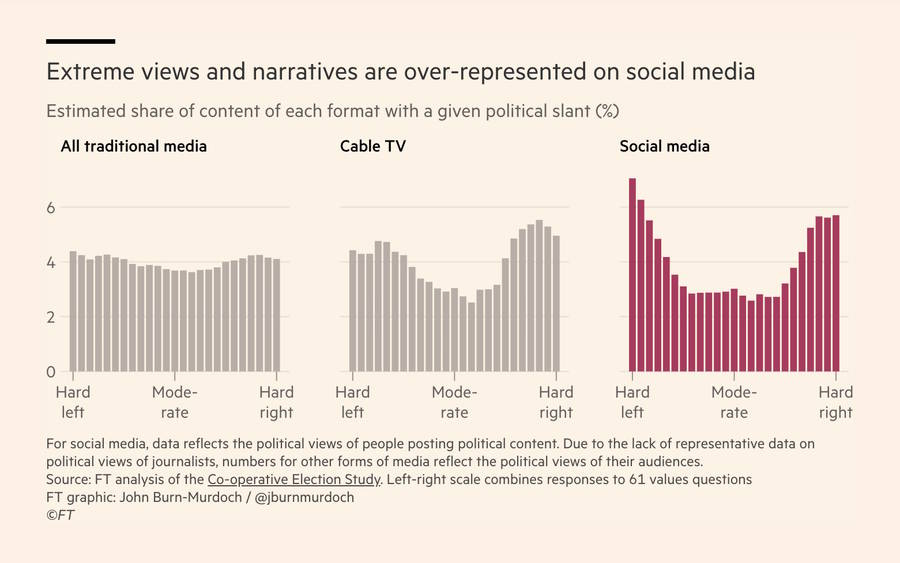
The hard left viewpoints that Trump is decrying are creatures of social media. Of course, right-wing shouters like Musk, Matt Walsh, etc. just contribute to the problem by trying to stir up alarm and hatred at “the left”. But because social media has convinced many of its users that they’re in an existential civil war with an implacable vicious enemy, they think that toning down their rhetoric would equate to unilateral disarmament. So no one tones it down.
This is extremely frustrating, because away from the screeching online meme wars, elected politicians are generally very good about this stuff. Gavin Newsom, Barack Obama, Kamala Harris, Tim Walz, Nancy Pelosi, Zohran Mamdani, Joe Biden, and every other important Democratic politician rushed to condemn Kirk’s killing. Even some major leftist influencers like Hasan Piker condemned it.
And yet people’s perception of what “the left” is about isn’t driven by elected Democrats, or even by influencers; it’s driven by the anonymous social media mob, the progressive shouters who are elevated by social media algorithms over and above more reasonable voices.
The same exact thing happens on the right. Almost no GOP politicians have expressed antisemitic or anti-Indian sentiment, and yet anti-Indian racism and antisemitism have become commonplace on X. Even right-wing influencers like Chris Rufo have denounced the “racialism, anti-Semitism, and conspiracism” they see bubbling up on the anonymous online right, but they’re powerless to stop it — or to stop it from defining “the right” in the eyes of many Americans.
Sometimes these anonymous hate mobs are just bored passers-by looking to blow off some steam, or malicious teenagers who don’t know better. Sometimes they’re American extremists who use armies of bots to amplify hateful sentiment. And in some cases, anonymous hate and extremism on English-language social media are amplified by the actions of foreigners seeking to divide and weaken the U.S.
A lot of the people you read on social media are simply fake. For example, the popular right-wing account “Wall Street Silver” (now called “Wall Street Mav”) is probably not an elderly man in the finance industry; he turned out to be the same person who manages another account called “Real Jessica”:
It’s technically possible that one of these identities is real, but I wouldn’t bet on it. These are deliberate fabrications by people who are more tech-savvy than the average American, whose purpose is fomenting civil conflict and internecine hatred in the United States. Here’s a good thread of what are probably bots spreading civil war rhetoric in the aftermath of the Kirk assassination.
Even when social media hate is not being farmed by bots, it’s still often being pushed by foreigners whose avocation is commenting on American politics from overseas. For example, here is a Frenchman encouraging Americans to see themselves as being locked in a civil war:
And here is a Malaysian man declaring that liberals have “hijacked the republican” despite never having actually lived in America:
Why should we Americans listen to Frenchmen and Malaysians who tell us to hate and fear our countrymen? Twenty years ago, we would never even hear from people like this; the people we talked to about these issues would have been almost entirely other Americans. Now, keyboard warriors who would never be in any danger of fighting in an American civil war feel free to urge us to slaughter each other, and social media pipes their vitriol directly to the screens in our pockets.
All of these effects — algorithmic elevation of divisive content, armies of bots and trolls, and intervention by foreigners — mean that social media is a uniquely polarizing force in our society. Nathan Witkin has a good post reviewing the evidence here, and rebutting those who have claimed that social media is politically benign:
In fact, I still think that American society in general is calming down from the unrest of the 2010s. The number of people being radicalized by platforms like X and Bluesky is actually fairly small. But they’re the people who are the most engaged in politics, and so they have an outsized importance on the direction of the nation. Even as most Americans tune out politics, the people who are actually running the show remain glued to an X feed that shows them weapons-grade hatred all day long. And unfortunately, the crazies who buy guns and shoot at the politically influential class are also mainlining that same social media hate.
As a result, although Americans are having fewer political arguments around the water cooler and at Thanksgiving dinner these days, the 2020s are also seeing an upsurge in prominent acts of sensational political violence:
I shouldn’t have to tell you how bad this is for our nation. A civil war is just about the most horrible thing that can happen to a country, both in social and economic terms. I still think the probability of an actual American civil war is relatively low, but if it does happen, it won’t be rifle battles in an empty field like last time — it’ll be more like the Spanish Civil War, with neighbors fighting neighbors, rampant atrocities on both sides, and the nation impoverished for many years.
Even assuming we manage to avoid that worst-case scenario, it’s possible that the U.S. will suffer a protracted period of elevated political violence, similar to the Years of Lead in Italy or the Troubles in Northern Ireland. With regular Americans too exhausted to take their country back, the political arena might be dominated for the next ten or twenty years by people who do nothing but mainline hate memes, egged on by America’s enemies and by the worst villains in our society.
Regular Americans need to fight back against the toxic idea that our neighbors are our enemies, or else that accusation will become a self-fulfilling prophecy.


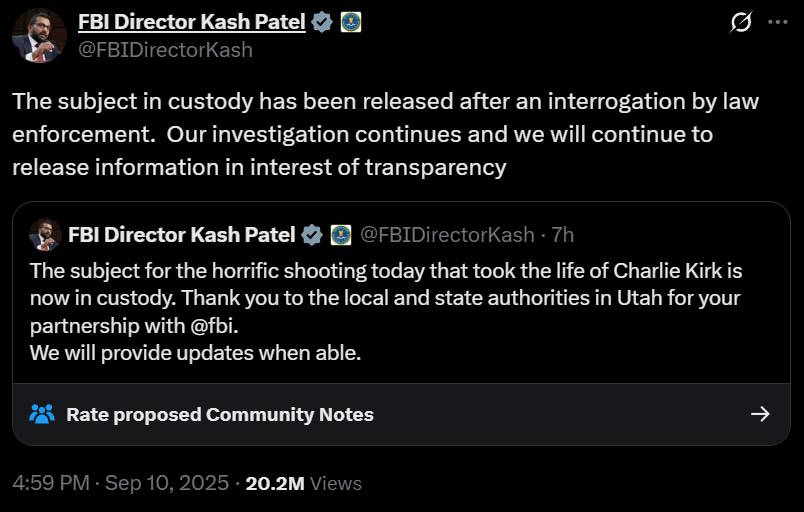
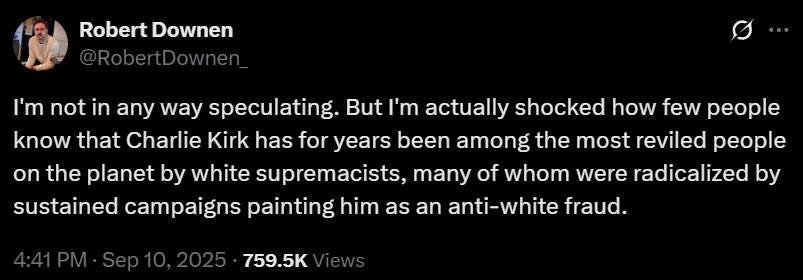
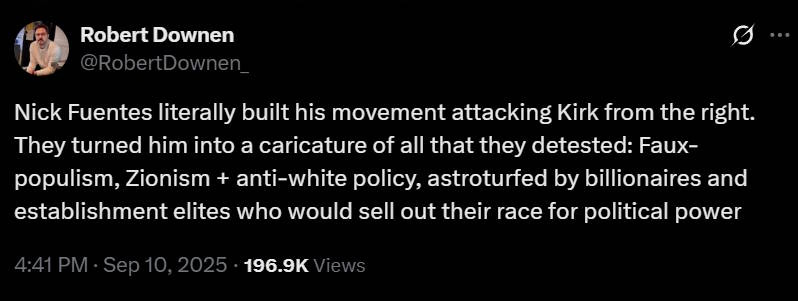
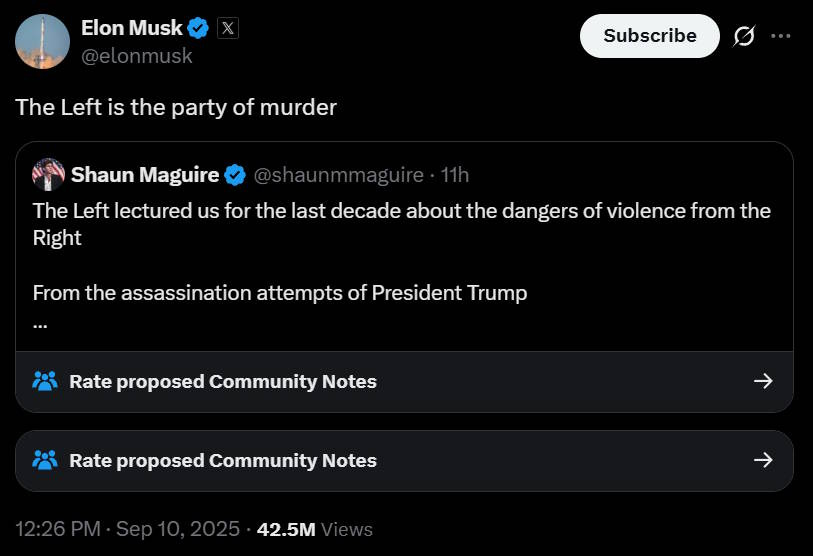
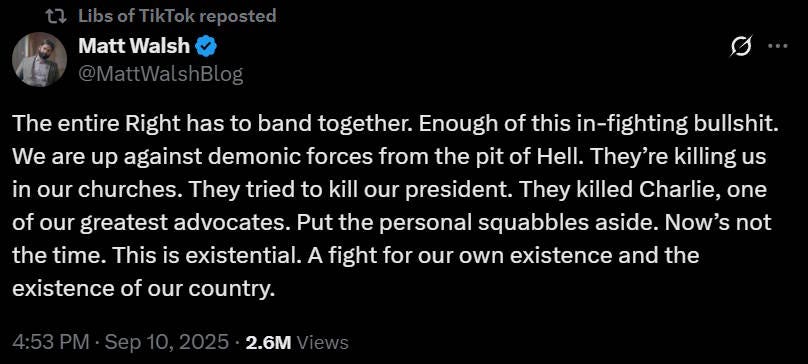
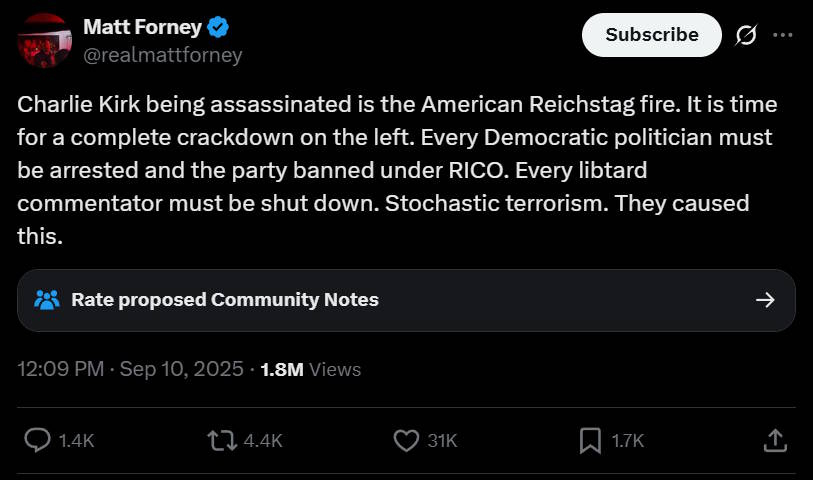
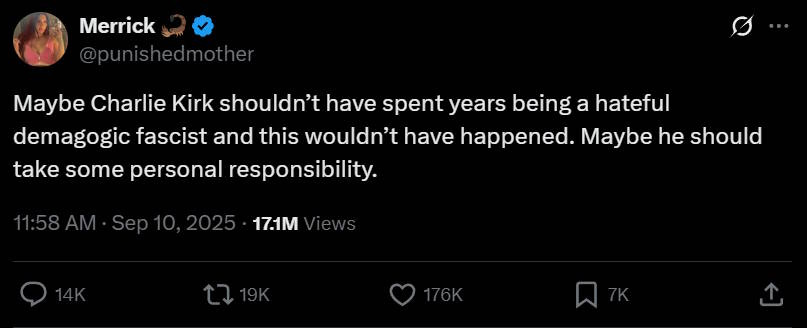
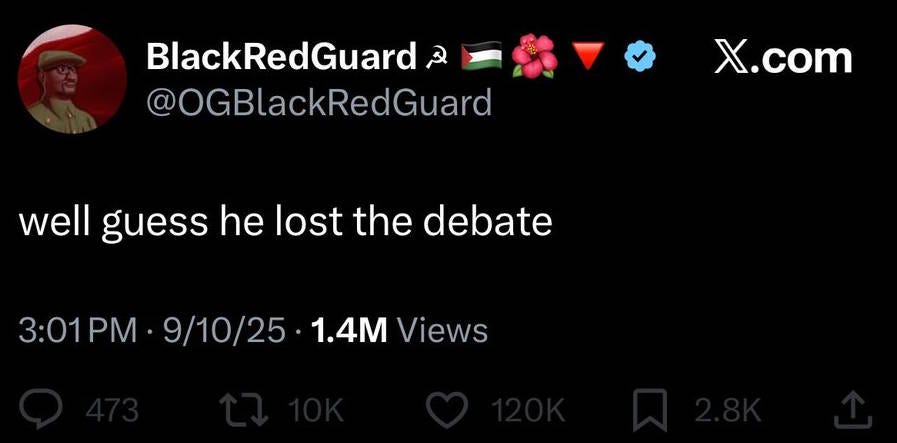

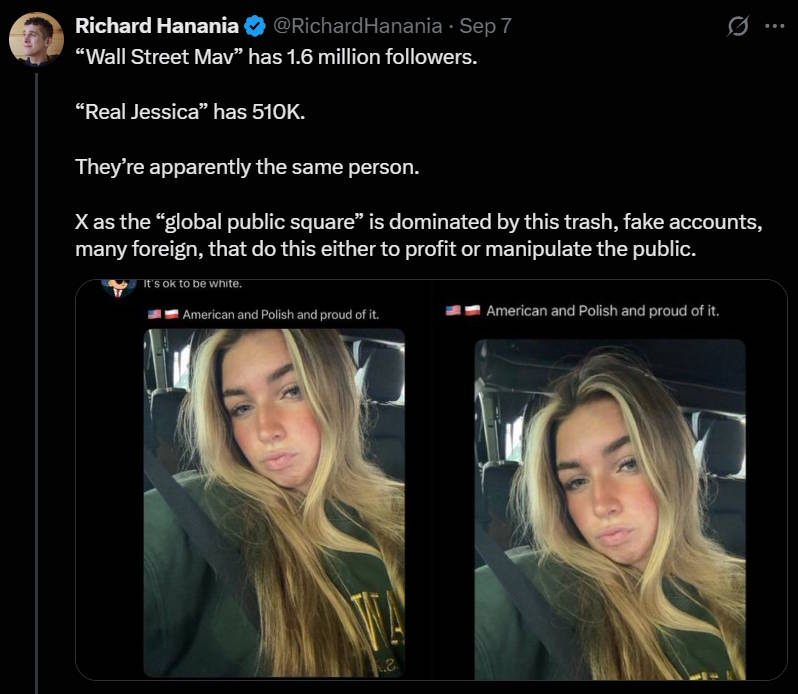



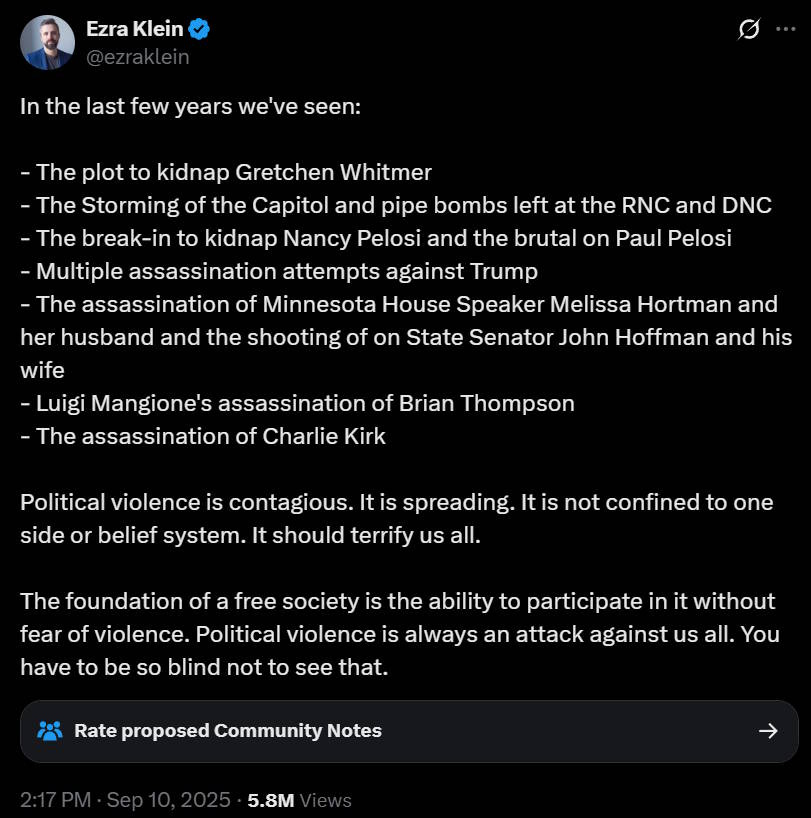
Noah, I’d be remiss if I didn’t note the imbalance of who the extremists are calling for violence.
As you noted, every Democratic politician of any note expressed basically the right sentiments on this assassination. Seriously, the most famous pundit express joy or “good riddance” with Kirk’s assassination is…who now?
On the right, well only the richest man in America who until quite recently was the President’s right hand man expressing how this assassination is a leftist plot. And oh yeah, the wife of Trump’s other right hand man (who recently called the Democratic Party a terrorist organization) saying how evil leftists are responsible.
Do I really need to catalog all of the worst stuff the President has said?
I’m sorry there is a real asymmetry which people with the most extreme rhetoric have power and influence in either party.
::Deep breath:: Kirk’s assassination is a tragedy. He leaves behind two kids without a dad. It is awful. But can you please take a look at the rhetoric he was putting out? Lots of “great replacement” stuff.
"I thought Donald Trump was actually on pretty solid ground when he called out radical leftists for poisonous rhetoric:"
Trump would be on even more solid ground if he himself weren't, *by far*, the most inflammatory purveyor of poisonous rhetoric.